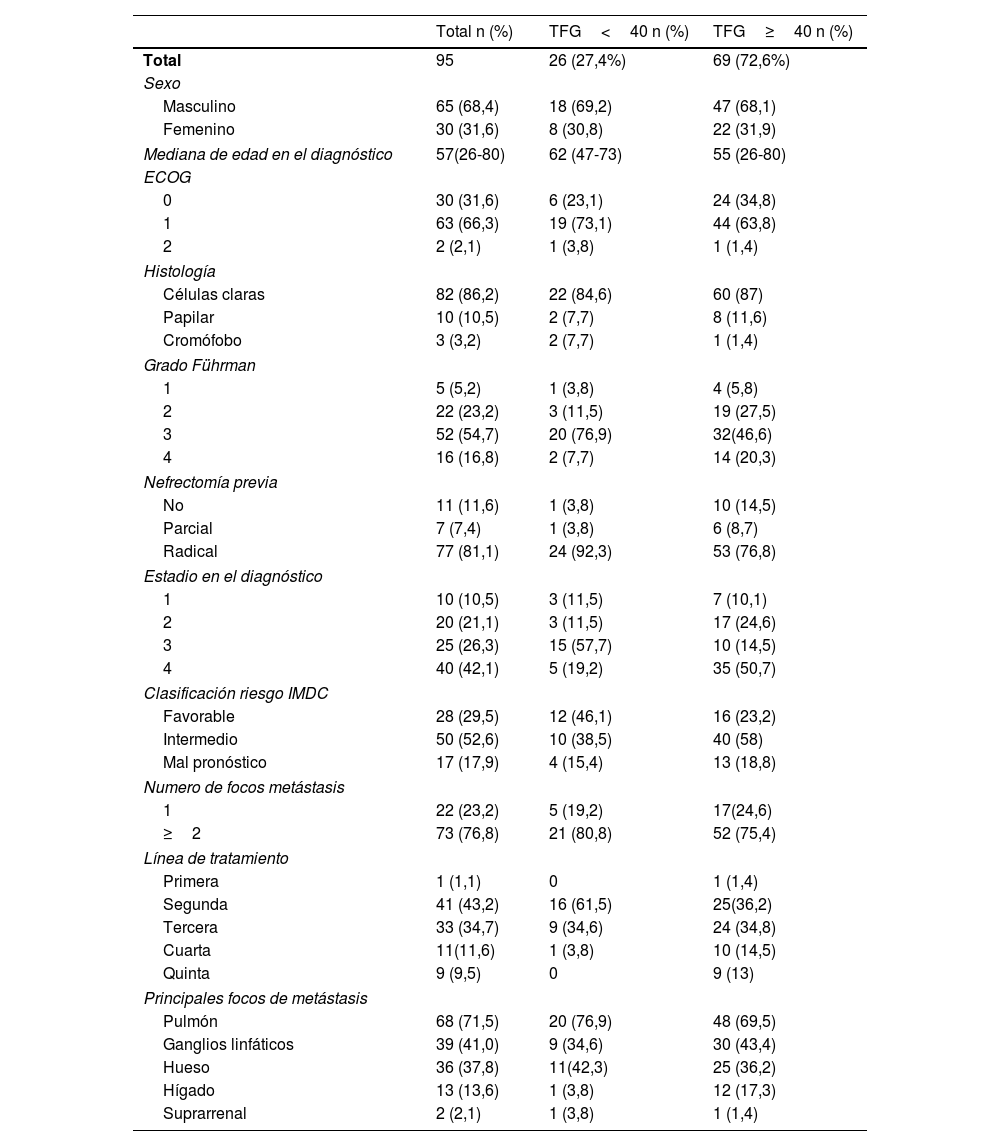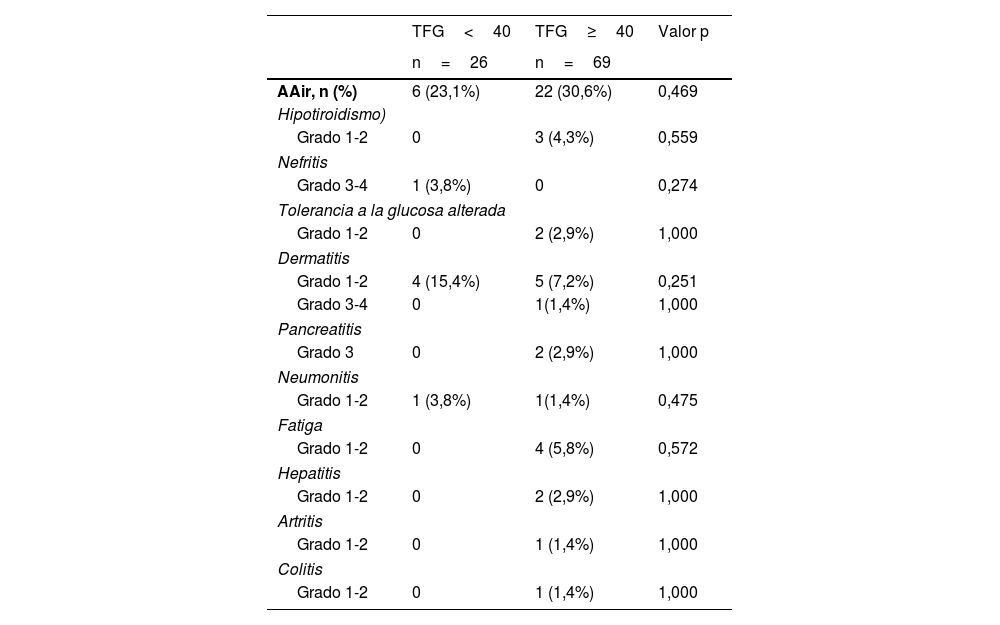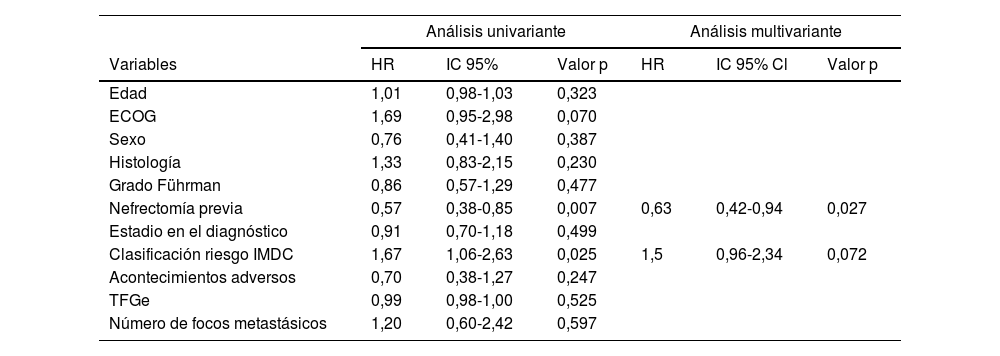Los pacientes con insuficiencia renal, normalmente definidos como aquellos con un aclaramiento de creatinina<40ml/min, fueron excluidos de los ensayos clínicos pivotales, concretamente en los estudios que incluían el tratamiento con nivolumab en pacientes con carcinoma de células renales (CCR). El objetivo de este estudio es evaluar la eficacia y seguridad del nivolumab en pacientes con CCR metastásico (CCRm) estratificados según su aclaramiento de creatinina.
Material y métodosSe analizaron retrospectivamente los datos de pacientes con CCRm tratados con nivolumab. Los pacientes se clasificaron en 2 categorías según su tasa de filtración glomerular estimada (TFGe); la primera categoría (C1) incluía a pacientes con TFGe<40ml/min/1,73m2 y la segunda categoría (C2) incluía a pacientes con TFGe≥40ml/min/1,73m2.
ResultadosDe los 95 pacientes incluidos 26 correspondían al grupo 1 (27,4%) y 69 al grupo 2 (72,6%). Ninguno de los del grupo 1 estaba en tratamiento con hemodiálisis. No hubo diferencias estadísticamente significativas en cuanto a la incidencia global de los acontecimientos adversos entre los 2 grupos (p=0,469). La tasa de respuesta global fue del 50% en el primer grupo y del 42,0% en el segundo (p=0,486). La mediana de supervivencia global (SG) fue más prolongada, con 23,3 meses en el grupo 2 frente a 11 meses en el grupo 1 (p=0,415).
ConclusiónLa insuficiencia renal es frecuente en pacientes con cáncer renal avanzado, debido a que con frecuencia son sometidos a nefrectomía y al empeoramiento de la función renal durante el tratamiento con inhibidores de la tirosina cinasa. No se observaron diferencias significativas en la seguridad y eficacia del tratamiento con nivolumab entre los 2 grupos. El nivolumab parece ser un fármaco seguro y eficaz en el tratamiento de pacientes con insuficiencia renal.
Patients with renal insufficiency, usually defined as those with creatinine clearance<40mL/min, were excluded from pivotal clinical trials, especially in studies involving nivolumab therapy in patients with renal cell carcinoma (RCC).The aim of the study is to evaluate the efficacy and safety of nivolumab in patients with metastatic RCC (mRCC) stratified according to creatinine clearance.
Material and metodsData from mRCC patients treated with nivolumab were retrospectively analyzed. Patients were classified into two categories according to their estimated glomerular filtration rate (eGFR); the first category (C1) included patients with eGFR<40mL/min/1.73 m2 and the second category(C2). included those with eGFR≥ 40mL/min/1.73 m2.
ResultsOf the 95 patients enrolled, 1. group included 26 patients (27.4%) and 2. group included 69 patients (72.6%). None of the pts in category 1 were on hemodialysis. Overall incidence of adverse events was not statistically different between the two groups (p=0.469). The overall response rate ORR was 50% in the first group and 42.0% in the second group (p=0.486). Median overall survival (OS) was longer with 23.3 months in the 2. group versus 11 months in the 1. group (p=0.415).
ConclusionRenal insufficiency is a common problem in patients with advanced renal cancer since they often undergo nephrectomy and their renal function may also worsen while receiving tyrosine kinase inhibitor therapy. We found that there is no significant difference in the safety and efficacy of nivolumab treatment between two groups. Nivolumab appears to be a safe and effective agent in patients with renal impairment.















